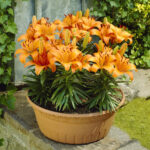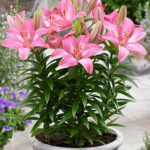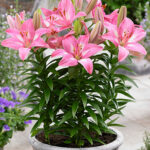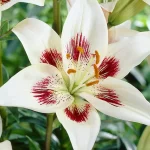Growing Lilium, commonly known as lilies, can be a rewarding experience for any gardener. With their beautiful, showy flowers and variety of colors and shapes, lilies are a popular choice for many gardens. Here are some tips on how to successfully grow lilies in your own garden.
First and foremost, it is important to choose the right location for planting your lilies. Lilies prefer well-drained soil and full sun to partial shade. Make sure the area you choose receives at least six hours of sunlight per day. Additionally, lilies do not like to be in areas with standing water, so be sure to plant them in a spot where water drains well.
When it comes to planting lilies, it is best to plant them in the fall before the ground freezes. Dig a hole that is about three times deeper than the height of the bulb and add some compost or well-rotted manure to the soil to help improve drainage and fertility. Place the bulb in the hole with the pointed side facing up and cover it with soil. Water the bulb thoroughly after planting to help settle the soil around the bulb.
Once your lilies are planted, it is important to keep them well-watered, especially during the hot summer months. Water the plants deeply at least once a week, making sure the water reaches the roots of the plant. It is also a good idea to mulch around the base of the plants to help retain moisture in the soil and suppress weeds.
Fertilizing your lilies is also important for their growth and blooming. Apply a balanced fertilizer in the spring when the plants emerge and again after they have finished blooming. Be sure to follow the instructions on the fertilizer package and do not over-fertilize, as this can lead to weak or leggy growth.
One of the most important things to remember when growing lilies is to deadhead the flowers once they are spent. This not only helps keep the plants looking tidy but also encourages them to produce more flowers. Simply snip off the spent flowers just below the flower head to promote new growth.
Finally, it is important to protect your lilies from pests and diseases. Keeping the garden free of debris and weeds can help reduce the risk of pests and diseases. If you do notice any pests or signs of disease on your lilies, take appropriate action to treat them as soon as possible to prevent further damage to the plants. With proper care and attention, you can enjoy beautiful lilies in your garden for many years to come.
 redboth.com Decoration ideas for your home
redboth.com Decoration ideas for your home
























































































